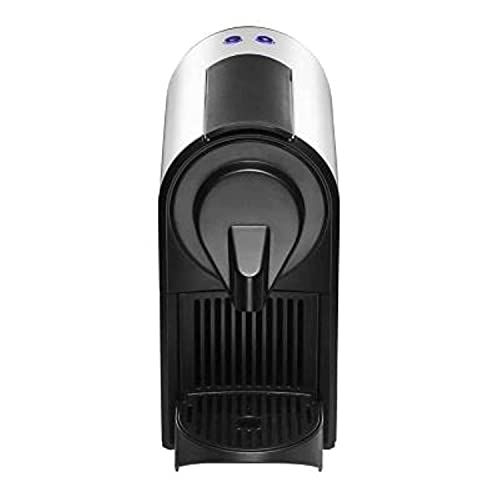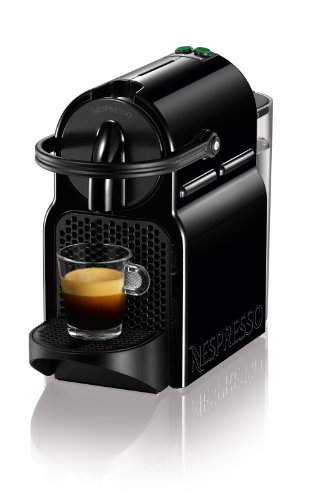9 Things Your Parents Taught You About Nespresso Coffeee Machine
페이지 정보

본문
 Nespresso Coffee - The Essenza Mini
Nespresso Coffee - The Essenza MiniThe Essenza Mini is compact, affordable, and extremely user-friendly. It forgoes features like the water tank and removable drip tray to stay small, but it makes excellent espresso and lungo.
It works by piercing capsules and pumping hot water under pressure to create different espresso and coffee nespresso machines sizes, such as the 1.35-ounce espresso, 2.7-ounce double espresso, 5-ounce gran lungo or 14-ounce alto. It can be used with an independent milk frother.
Capsules
With the Nespresso system you can brew a cup of coffee with the press of a button. You can choose between a single-serving cup or a larger size, and each capsule contains the correct amount of coffee beans to give you the strength you want. You can also add milk powder to make a cappuccino or macchiato latte. The capsules are made from biodegradable ingredients and can be recycled or disposed of in a way that is guilt-free.
The pods are constructed of aluminium which allows them to withstand the high pressure from the machine. The hermetically sealed pods are tamper-proof and the coffee grounds inside remain fresh and safe from moisture and oxygen. Additionally, the aluminum is recyclable 100 and is in line with Nestle's sustainability objectives.
The system has its own disadvantages. The machines are costly both to purchase and operate. The capsules are also costly to purchase and must be replaced often. Additionally capsules are only compatible with Nespresso-branded capsules. This has led to several lawsuits between Nestle and third-party companies which utilize the same extraction techniques and ingredients as Nespresso.
Despite these drawbacks, the Nespresso system is a great option for many reasons which include premium coffee and environmental sustainability. It's a great alternative for regular coffee and tea, and it has an extraction rate that is higher than the majority of single-serve systems. In fact, a single capsule can produce up to 14 ounces of espresso coffee.
The first capsule was designed in 1976, and then patented in 1978. The main characteristics of the capsule are an outer cone of aluminum, a flattop with a cylindrical recess, through which the machine can inject water, and a tiny opening in the bottom that is punctured both above and below. The capsule spins at 7700 rpm by the machine to inject water into the coffee to create a thick, creamy crema.
Water
If you're using a Nespresso machine, it is essential to have water of high-quality. This helps ensure consistent quality and is important for flavor and texture. Ideally, you should use water that has been "filtered" or "spring," and avoid tap or distilled water.
In our lab tests, we've discovered that Nespresso machines with top-quality softened water can make more satisfying espressos and lungos than those that use hard water. Hard water can lead to calcium deposits and other issues that impact the taste of your coffee.
During each cup of coffee The Nespresso machine is able to take in and pumps out hot water under high pressure. This process is known as extraction. The duration, temperature, and pressure of the extraction process is what determine the taste and intensity of your coffee.
The original machines are pierced and then pump the capsule, while the Vertuo models read barcodes that are printed on the capsules to determine how much water is required for a specific type of espresso. The Vertuo models can brew six different drink sizes, including lungos and espressos, with or without a cap of foam.
All machines included in the nespresso machine original line produce 19 bars. Some of the more expensive models also brew cappuccinos as well as latte macchiatos and some models even provide the option to make iced coffee.
The Inissia and U series machines have small bodies, which makes them ideal for tight spaces. The Nespresso Pixie, which has a built-in frother, is another compact option. It can be combined with the app of nespresso coffee machine to get customized recipes and reorder capsules. nespresso Coffeee Machine is an excellent choice for those who want to reduce their carbon footprint while also supporting the company's sustainability initiatives.
Temperature
Nespresso machines are more complex than your typical coffee maker, but they're also designed to be fast and easy to use. Each capsule is prepared in a matter of seconds. They are also relatively energy efficient. Nespresso machines use less energy than traditional drip coffee makers to make the capsules.
Most Nespresso coffee machines are made for espresso-based drinks, but some models have milk frothers that can be used to make cappuccinos or lattes. Some models have a dedicated capsule container that can hold 12 capsules at a time. This makes it easier to recycle.
The Nespresso name is backed by several well-known kitchen equipment manufacturers, including Krups DeLonghi, and Breville. However, the majority of the machines are manufactured by Eugster/Frismag, a Swiss company that is one of the biggest coffee machine manufacturers in the world. This has led to criticisms of the company's use patents and other similar strategies like those employed by printer manufacturers to create lock-ins for vendors.
Pressure
To achieve the best espresso, you must maintain the same pressure throughout your extraction. This is referred to as "pressure profiling." Pressure profiling entails adjusting the amount of pressure that is applied to the coffee grounds to get the best extraction and maximize flavor. This method is possible by using various espresso machines, including Nespresso coffee makers.
There are a number of different ways espresso machines manipulate pressure during the extraction process. One method is through a balanced bypass that regulates water pressure to a specific value (typically 9 bar), regardless of the inlet pressure. This simple and efficient technique ensures that the pressure in every espresso group is the same throughout the extraction process.
A lever or control knob can be used to adjust pressure manually. This is a more difficult method, but it could offer a higher level of customization and control. It is important to keep in mind that manual pressure regulation could cause unsatisfactory results, therefore it requires a lot of skill and concentration.
In addition, certain espresso machines utilize a dynamic pump that alters the pressure in accordance with the temperature of the grounds as well as the type of coffee being used. This is a more sophisticated system, however it will produce more reliable results than other kinds of espresso machines.
Nespresso has a range of machines that make lungo and espresso drinks, and some can also frother milk. The nespresso white coffee machine Inissia is a great machine for home baristas. It can make 7 to 9 espressos at a time and has a water tank of 33 ounces. The machine has buttons that let you choose different sizes of drinks and a tray for capsules that can hold up to nine used pods. The Nespresso Vertuo Next is designed for versatility and features 11 milk temperatures and eight milk textures to select from. It also comes with a large, stainless steel milk frother wand and an insulated container that can hold up to 18 ounces of capsules that have been used.
Cleaning
When you use a Nespresso machine it will leave behind tiny mineral and limescale deposits each time you make a cup. These may get mixed with your coffee and cause it to taste off. It is essential to clean your Nespresso machine regularly, as well as all its components. The removable components like the drip tray capsule container, washer and drip tray must be cleaned and decalked during a deep clean. A regular rinse of the capsule container with clean water can also help prevent mineral buildup.
De-scaling solutions can help eliminate mineral deposits from your machine. These products are sold at a majority of coffee shops and appliance stores. You can also make use of vinegar. This abrasive cleaner won't damage your machine but it may take a little longer to dissolve the minerals than a descaling liquid.
If you choose to use vinegar, take out the coffee pods first before you empty the reservoir. Then, pour out the remaining water from the tank, including any filters. Pour the vinegar into the tank and run the cycle without coffee pods to allow it to pass the machine. Then, rinse with clean water and run several more cycles to make sure there is no trace of vinegar remaining in the machine.
 When you've got your machine cleaned it is time to clean the exterior and removable parts. Be sure to pay attention to the corners and crevices where gunk could get caught. Wash the removable parts in your dishwasher or hand wash them using mild soap and water. Make sure to thoroughly rinse. Examine the seals on the capsule as well as the coffee outlet, and replace them if needed to keep their elasticity.
When you've got your machine cleaned it is time to clean the exterior and removable parts. Be sure to pay attention to the corners and crevices where gunk could get caught. Wash the removable parts in your dishwasher or hand wash them using mild soap and water. Make sure to thoroughly rinse. Examine the seals on the capsule as well as the coffee outlet, and replace them if needed to keep their elasticity.- 이전글Bio Ethanol Free Standing Fireplace Tools To Improve Your Daily Lifethe One Bio Ethanol Free Standing Fireplace Trick Every Individual Should Be Able To 24.11.23
- 다음글Five Killer Quora Answers To Treadmills Home Gym 24.11.23
댓글목록
등록된 댓글이 없습니다.